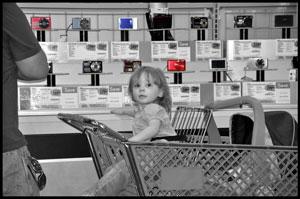Advice for Buying a Digital Camera
Published 12:00 am Monday, February 22, 2010

- Photo by Amber Flowers, Soul Gaze Photography.
Standing in the camera section of your local store, you decide you want to buy a camera. Planning to make a quick browse and leave, you pick up a few trying to determine the differences. Suddenly a store associate approaches you and offers you assistance. What do you do? Where do you begin? Buying a new camera can be a challenging prospect whether it’s your first camera or you are planning to upgrade from your current camera.
A photographer’s camera is nothing more than paint and paintbrushes for an artist. No matter how much money you spend for high quality supplies, you are the one creating the masterpiece. Don’t assume that the more money you spend the better photographer you will be. Whether it’s your first camera or an upgrade there will always be something you can learn. Photography is only as good as the photographer. The more time spent learning and practicing the better you will be. This also applies to choosing your equipment. What you ultimately decide may be influenced by these factors, but you also need to make sure what you choose will satisfy you until the time you choose to upgrade. Also keep in mind that your tastes may change. Choose a camera versatile enough for your other interests in the future.
The first step to owning your new camera is to determine your budget. Not just for a camera but for batteries, tripod, memory card, camera bag and anything else you may want. Next you need to decide if you want the convenience of digital or the unique experience of film. With digital, being able to instantly view and delete images is very beneficial. If you are unsure, do your research and talk to owners of digital and film. Ask about the pros and cons so you can more easily decide for yourself. Another important step is to ask yourself how you will be using your camera. Are you planning to photograph just for everyday usage or more heavy use like a professional photographer? Also what exactly are you planning to photograph? Most cameras, except the most expensive DSLRs, have several ‘preset’ settings to assist you in getting the shots you want without the knowledge required. They also have a manual setting giving you more control once you feel ready to have additional control. Just don’t ever expect any camera to give you perfect images right out of the box. Read your manual and never be afraid to ask for assistance.
When choosing a camera for landscapes and nature, it will need to be able to handle the outdoors. Moisture and extreme temperature changes can be damaging. You can purchase protective covers as an option to getting a weather sealed camera since most lenses aren’t weather sealed. Sports and some events need a fast camera/lens with excellent low-light capabilities and able to use higher shutter speeds. A DSLR is your best choice in this instance. Although the ability to change lenses is very convenient when you are too far away to get the shot you want, there are also digital cameras with surprisingly good digital-zoom currently available. You will need to purchase a tripod in either case to ensure your images are crisp and without blur (unless that is your intent). Keep in mind that if you choose a DSLR over a point and shoot, your DSLR is a part of your photography ‘system’. Don’t spend your entire budget on the camera. Leave money for flash and additional lenses. Most cameras lose resale value over time, but lenses rarely do. With most, the value actually increases. Research for cameras that are recommended for the type of photography you want to concentrate in. Also don’t forget to consider the size and weight of the camera. Will it be comfortable to hold or carry the camera for an extended time? Are the controls located where it will be easy to use the camera without straining your fingers?
Once you’ve narrowed down your choices and decided what you want in a camera then you need to utilize the internet and store associate’s knowledge. Get opinions and recommendations. Browse cameras online and in stores. Several years ago, the amount of megapixels was the most important feature of a digital camera. Over the years technology has improved. We’ve learned that megapixels mainly are used to determine print sizes. Unless you work as a pro you don’t need to look for the highest megapixel camera. If you plan to print 8×10 images at the most, then a minimum of 6 MP is plenty. Any lower and the quality will deteriorate. Of course if you want to spend the extra for more MP that’s up to you. It certainly won’t hurt your images! Another great resource are the reviews you can find online for almost any model of camera. One example is www.dpreview.com. This site has tools for comparing cameras as well as reviews on most cameras. Never buy the first camera you see or allow a sales associate to talk you into a camera because it’s ‘the best’. Buying on impulse can trap you with a camera you’re not happy with. Return policies are usually very short on cameras so be sure before you buy. Make sure to read all the fine print regarding return policies, shipping and warranty information when buying a camera…especially online. Be wary of stores and websites that have a thousand dollar camera on sale for a couple hundred. With a little research you should now have a good foundation to make a well-informed decision on your first digital camera.
Familiarize yourself with camera terms in this online digital camera glossary: http://www.dpreview.com/learn/?/glossary/
A few popular online retailers: Adorama, BH photo video, Calumet Photo, Amazon (shipping prices vary) and Wal-mart.
A few popular stores: Best Buy, Wal-mart, K-mart, Target, Bowling Green, Louisville and Nashville camera stores.
 About the author: Amber Flowers is a photographer, digital artist and writer most known for her infrared photography and the ‘fine art’ feel to her work. She is a member of The League of Creative Infrared Photographers and Founder of Southern Kentucky Photographer’s Club. Amber resides in Glasgow KY with her husband, two children and several pets. You can learn more about her on her website: www.soulgazephotography.com
About the author: Amber Flowers is a photographer, digital artist and writer most known for her infrared photography and the ‘fine art’ feel to her work. She is a member of The League of Creative Infrared Photographers and Founder of Southern Kentucky Photographer’s Club. Amber resides in Glasgow KY with her husband, two children and several pets. You can learn more about her on her website: www.soulgazephotography.com






